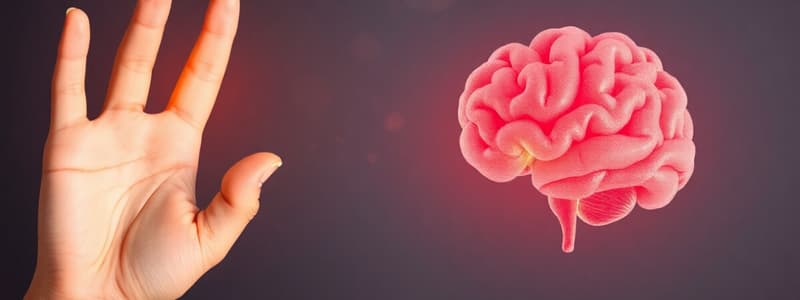Podcast
Questions and Answers
Which component of working memory is responsible for coding information visually?
Which component of working memory is responsible for coding information visually?
- Episodic buffer
- Visuo-spatial sketchpad (correct)
- Central executive
- Phonological loop
Long term memory does not exhibit developmental trends after school age.
Long term memory does not exhibit developmental trends after school age.
False (B)
What is the purpose of interventions in developmental psychology related to reading difficulties?
What is the purpose of interventions in developmental psychology related to reading difficulties?
To develop strategies for children who are struggling with basic educational stages.
The __________ is a crucial cognitive skill that assists in understanding the sounds structure of words, which is important for reading.
The __________ is a crucial cognitive skill that assists in understanding the sounds structure of words, which is important for reading.
Match the following cognitive skills with their relevant components:
Match the following cognitive skills with their relevant components:
What is a significant predictor of future reading abilities in young children?
What is a significant predictor of future reading abilities in young children?
Insensitivity to rhyme indicates a good grasp of phonological awareness.
Insensitivity to rhyme indicates a good grasp of phonological awareness.
What methodology did Bradley & Bryant utilize in their key study?
What methodology did Bradley & Bryant utilize in their key study?
The Neale Analysis of Reading Ability (NARA) includes passages that increase in ______.
The Neale Analysis of Reading Ability (NARA) includes passages that increase in ______.
Match the concepts with their definitions:
Match the concepts with their definitions:
What does the phonological loop in working memory specifically help with?
What does the phonological loop in working memory specifically help with?
Children with poor reading skills do not experience issues with sound categorization.
Children with poor reading skills do not experience issues with sound categorization.
What method did Gathercole et al. (1992) use to establish the relationship between non-word repetition and reading scores?
What method did Gathercole et al. (1992) use to establish the relationship between non-word repetition and reading scores?
The process of rehearsing earlier syllables while reading later syllables is known as ________.
The process of rehearsing earlier syllables while reading later syllables is known as ________.
Match the following terms with their descriptions:
Match the following terms with their descriptions:
Which of the following is a common issue faced by children with language impairment?
Which of the following is a common issue faced by children with language impairment?
Practicing non-word repetition has no effect on improving phonological working memory capacity.
Practicing non-word repetition has no effect on improving phonological working memory capacity.
What was the significance of the Primary Reading Test (PRT) in the study by Gathercole et al. (1992)?
What was the significance of the Primary Reading Test (PRT) in the study by Gathercole et al. (1992)?
Flashcards
Sensory Memory
Sensory Memory
Briefly holds sensory information in sensory memory registers.
Working Memory
Working Memory
Actively processes information using phonological and visuospatial systems.
Long-Term Memory
Long-Term Memory
Stores information semantically (by meaning).
Reading Difficulties
Reading Difficulties
Signup and view all the flashcards
Educational Interventions
Educational Interventions
Signup and view all the flashcards
Sound Categorization
Sound Categorization
Signup and view all the flashcards
Bradley & Bryant Study (1983)
Bradley & Bryant Study (1983)
Signup and view all the flashcards
Longitudinal Study
Longitudinal Study
Signup and view all the flashcards
Neale Reading Test (NARA)
Neale Reading Test (NARA)
Signup and view all the flashcards
Phonological Loop
Phonological Loop
Signup and view all the flashcards
Non-Word Repetition Task
Non-Word Repetition Task
Signup and view all the flashcards
Predict Reading Development
Predict Reading Development
Signup and view all the flashcards
Gathercole et al. (1992)
Gathercole et al. (1992)
Signup and view all the flashcards
Primary Reading Test (PRT)
Primary Reading Test (PRT)
Signup and view all the flashcards
Association
Association
Signup and view all the flashcards
Improve Phonological Loop Capacity
Improve Phonological Loop Capacity
Signup and view all the flashcards
Beginning of Sentences
Beginning of Sentences
Signup and view all the flashcards
Study Notes
Course Overview/Week 2: Interventions for Reading Difficulties
- The course covers cognition across the lifespan, focusing on interventions for reading difficulties in the classroom.
- Week 1 lectures include a course overview/handbook, and memory recap focusing on development throughout primary years.
Memory Recap
- Sensory memory stores sensory information briefly. It's passive and not affected by development after school age.
- Working memory is active and under control, encoding information phonetically (phonological loop) and visually (visuo-spatial sketchpad). It shows developmental trends related to primary years learning and education.
- Long-term memory, for meanings, encodes information in semantic form, showing development aligned with working memory.
Reading Difficulties
- Potential difficulties include sound categorization, memory, and comprehension.
Interventions
- Developmental psychology in education plays a crucial role in understanding the development of basic education stages in children.
- Understanding the cognitive skills that underpin literacy and numeracy can help develop interventions for children struggling with reading, writing and numbers.
Some Children Struggle to Read
- Understanding the underlying cognitive issues is crucial to develop effective interventions.
- Interventions can help identify and predict poor readers.
- It is important to fight stigma associated with reading difficulties.
Difficulties with Sound Categorization
- Poor readers often exhibit insensitivity to aspects of sound like rhyme and alliteration.
- Psychologists study young children to understand categorization of sounds through longitudinal and intervention studies.
Key Study: Bradley & Bryant (1983)
- A longitudinal study of 368 children aged 4-5 over three years.
- Initial testing included word recall, verbal IQ, and sound categorization. Followed up with IQ, Reading, and Spelling in later years.
Sound Categorization at T1
- Table 2 presents examples of categorisation tests and average scores across age groups. This data shows how sound categorization abilities develop.
Neale Reading Test (NARA)
- NARA, developed by Marie Neale, is used to assess reading ability.
- It involves graded passages that increase in difficulty, covering reading aspects including word recognition, vocabulary, and comprehension. A practical task/ test example includes comprehension of a simple story.
Schonell Spelling Test
- Spelling age is calculated by adding 5 to the number of correctly spelled words divided by 10; for example, 25 correctly spelled words divided by 10 yields 7.5 years of spelling age. This is a practical and common task based on word knowledge.
Findings: Longitudinal Study
- Children's ability to categorize sounds before reading significantly predicts reading and spelling performance 3 years later.
- This relationship is particularly strong in younger children.
Intervention Study
- 65 children with low-scoring standardized tests and difficulty categorizing sounds were divided into four groups.
- Group 1 received sound categorization training.
- Group 2 received sound categorization + letter identification training.
- Group 3 received conceptual categorization training (e.g., animals).
- Group 4 (the control group) received no training.
- Forty individual training sessions over two years.
Findings: Intervention Study
- Sound categorization can improve; focusing training on recognizing sounds is key. Tasks such as describing sounds and comparing words based on the beginning, middle or end sounds were used.
- There were notable improvements in reading, spelling, and maths for the groups involved that were trained compared to the control group.
Difficulties with Memory
- Categorizing sounds is not enough for reading; efficient learning (memory) of words and their meanings is essential.
- Words must first be effectively processed in working memory (specifically, the phonological loop) before entering long-term memory.
Phonological Loop
- A component of working memory. The phonological loop is vital for processing and storing auditory and verbal information, important in listening comprehension, speaking, reading, following complex instructions, and problem-solving.
- Critical for phonological awareness.
Word Recall
- Word recall improves with age, parallel to working memory development.
- This improvement in recall is due to a combination of language abilities and faster rehearsal of words.
Key Study: Gathercole & Baddeley (1993)
- The study investigated the components of working memory that are deficient in language-impaired children aged 6-10.
- A non-word repetition task, where participants repeated nonwords (e.g., blonterstaping) of varying length, was used. This task specifically tested the phonological loop within working memory.
Phonological Loop: Improving Capacity
- The non-word repetition task, focusing on phonological loop, can improve a child's capacity for working memory and helps with processing and storing sounds when reading.
- Practical application: Focus on the initial parts/beginning of words/sentences, rather than trying to learn the entire passage or sentences all at once when reading, so the rest is more easily recalled.
Homework and Revision: Week 1 Learning Outcomes
- Review of Week 1 learning outcomes.
Check Your Learning
- Questions on understanding difficulties in reading skills via sound categorization and working memory.
Further Resources
- Optional reading and viewing materials relating to the study topics.
Articles
- Several research articles are listed about the various studies discussed
Other Readings
- External readings to support the understanding of the topics discussed.
Studying That Suits You
Use AI to generate personalized quizzes and flashcards to suit your learning preferences.




